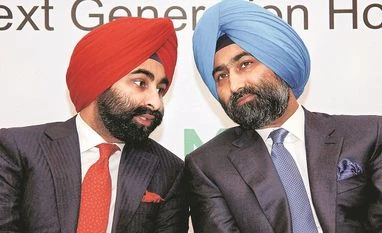The Delhi High Court has ordered former Ranbaxy Laboratories promoters Malvinder Singh and Shivinder Singh not to part with any unencumbered (charge-free) assets without first approaching it to secure funds for a Rs 2,562-crore Singapore arbitration award in favour of Japanese pharma major Daiichi Sankyo.
The next date of hearing is March 20.
Senior advocates C A Sundaram and Arvind Nigam, appearing on behalf of Daiichi, began the day’s proceedings by pressing an application to restrain the Singh brothers from transferring shares in subsidiary companies of RHC Holdings, the holding company for a majority of the former Ranbaxy promoters’ assets. The application followed two previous attempts to stop the possible sale of Fortis Healthcare, which the Singh brothers have claimed is only to infuse capital into the enterprise and represents five to 10 per cent of their encumbered asset value.
The Daiichi counsels said the Singh brothers had not given details of their unencumbered assets as directed by the court on January 23. And, alleged discrepancies between the figures provided and the actual unencumbered shareholding, which they claimed was worth only Rs 1,600 crore. The advocates also showed evidence of charges on all present and future assets of RHC Holdings for previous borrowings by the company. This, they say, could threaten the realisation of the Singapore award at a later stage.
Responding to the allegations, senior advocates Abhishek Singhvi and Rajiv Nayyar, representing the former Ranbaxy promoters, stated Daiichi had itself failed to comply with the January 23 order. It had still not filed a confidentiality affidavit with regard to the privacy of the Singh brothers' assets, as previously directed by the court. Singhvi reiterated that any proposed stake sales were only of encumbered assets, contemplated to ensure the well-being of the companies and to enhance value for all stakeholders.
He said the brothers had at least Rs 5,000 crore in unencumbered assets by conservative estimates, more than sufficient to secure the arbitral award if payment became necessary.
More From This Section
After hearing the arguments judge S Muralidhar sided with the Daiichi counsels and concluded the affidavits filed by the Singh brothers had failed to detail the complete list of unencumbered assets. He asked them to file all necessary details, not only their investments, loans and advances. Additionally, they are to file a list of all borrowings which are secured by present and future assets. He also directed the chartered accountants of RHC Holdings and other subsidiary companies to furnish certificates of book and fair market values of all such unencumbered assets.
Referring to the January and February statements by the Singh brothers, Muralidhar recorded submissions where they had expressed no intention of selling unencumbered assets and to keep the amount of the award secure. As a preventive measure, the court went on to pass an order requiring the former promoters to first apply to the court if there was to be any change in their unencumbered assets.
Daiichi had approached the HC last year, seeking enforcement of the Rs 2,562 crore arbitral award against the Singh brothers, as well an additional Rs 1,000 crore in interest payments and lawyers fees, incurred in association with the proceedings. The April 2016 arbitral award came on the backdrop of actions initiated by Daiichi against the former Ranbaxy promoters in relation to their 2008 purchase of a majority stake in the pharmaceutical enterprise.
The Japanese company has alleged that the stake sale to them was made through the concealment and misrepresentation of critical information regarding US Federal Drug Administration and Department of Justice proceedings, which cost Daiichi $500 million in settlement fees in the year 2013.
)